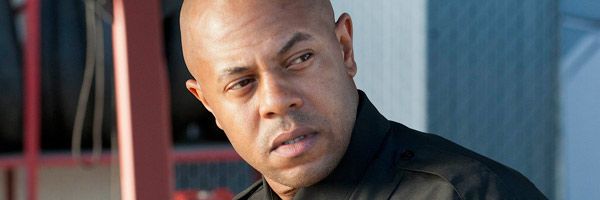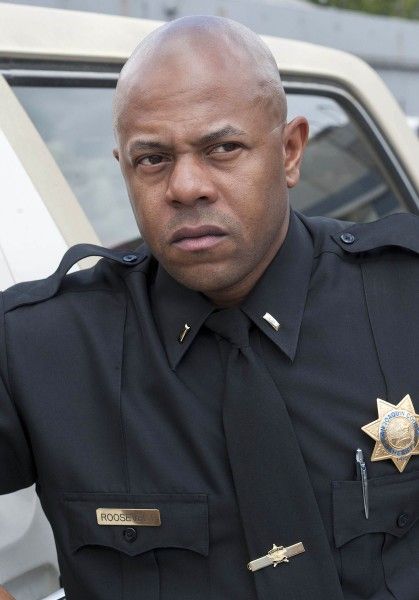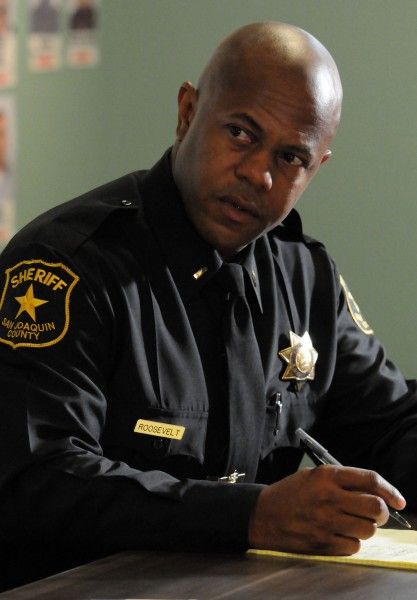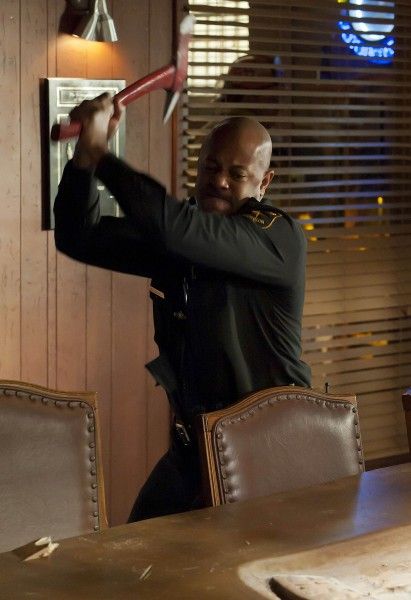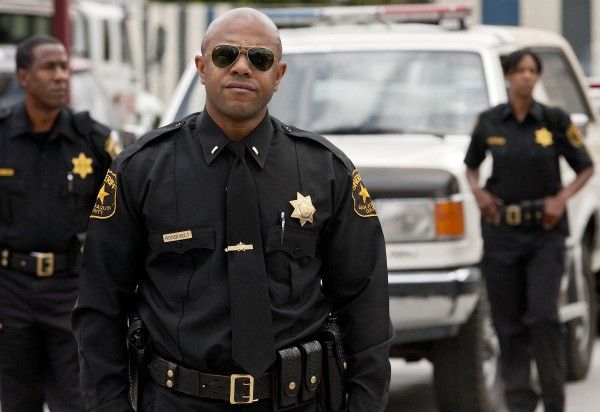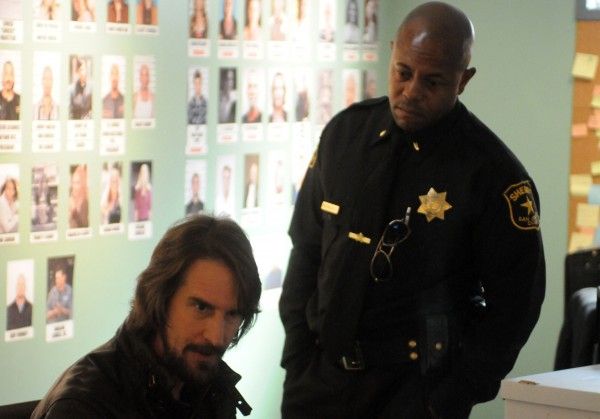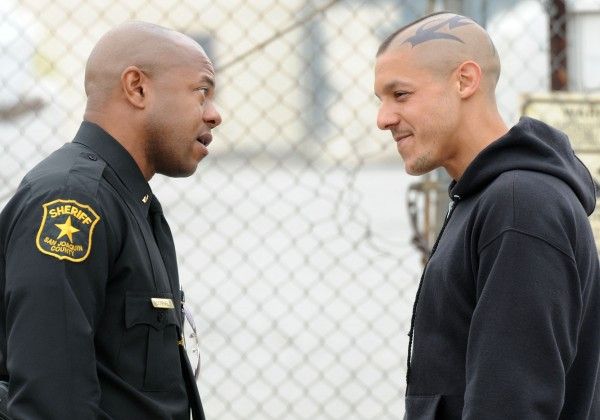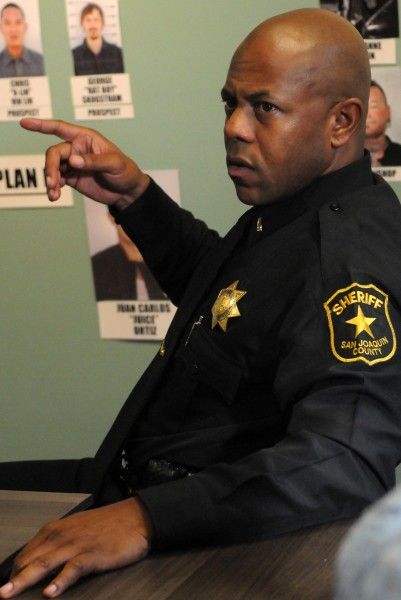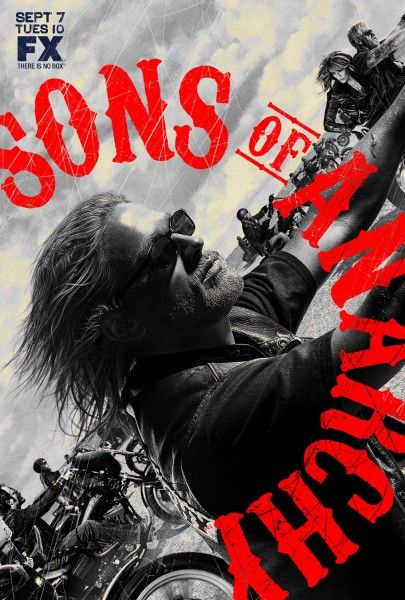On the FX drama series Sons of Anarchy, actor Rockmond Dunbar (Terriers, Prison Break, Soul Food) stars as Charming’s new lawman, Eli Roosevelt, a no-nonsense member of the San Joaquin Sheriff's Department, he takes his job seriously and doesn’t like to be manipulated. Recruited into Assistant U.S. Attorney Lincoln Potter’s (Ray McKinnon) task force to help bring down the Sons’ gun-running operation, he quickly realizes that he is also just a pawn in a larger scheme.
During a recent interview to promote his role on Season 4 of the popular show, Rockmond Dunbar talked about how recent events will effect his character’s actions, that Eli comes from a lineage of police officers, that his character was originally supposed to die after 10 episodes, how much he loves working with Peter Weller as a director, and that he has family members that were in the first black Harley motorcycle gang, The East Bay Dragons. He also talked about a film he directed and produced called Pastor Brown, that will be released in theaters next Spring. Check out what he had to say after the jump:
Question: Do you think Eli is going along with Lincoln (Ray McKinnon) now because he has no choice, or do you think he believes it’s the right thing to do, to take on the club?
ROCKMOND DUNBAR: We just wrapped the full season, so I know where it’s going and where it ends, and I can’t tell you, unfortunately, but it’s going to be a really interesting twist. Everyone thinks that they know exactly what’s going on, but (show creator) Kurt [Sutter] is so genius with his writing and storytelling that you’ll never be able to figure it out. When we read through the scripts for the next episode, it’s always surprising. We have a great, talented group of writers. It’s going to be interesting.
What is going on in Eli’s mind now, based on the recent events?
DUNBAR: I think it’s going to be very clear, towards the end of the season. Those thoughts will actually be verbalized and played into action. But, to give you where he is right now, he doesn’t like to be manipulated, or bend to do things that are unnecessary. He does like to be fair, but at the same time, his life of criminal activity is really harsh. So, what’s going on in his mind right now is that he’s being manipulated and he doesn’t like it, and he’s trying to figure out how to get out of this situation while also policing his town. It’s very, very difficult, when you are under the stronghold of another government official, and can be put in the position where you might not be able to do the things that you love, so he’s trying to figure that out. He’s very, very conflicted.
What do you think Eli’s feelings are towards the club?
DUNBAR: I think he’s an honest, straightforward police officer, no ifs, ands, or buts. I don’t think he’s a negative, bending-the-rules type of guy. He loves policing and he loves his job, and he can never be flipped or turned into something else that he’s not. He will always try to do the right thing, and the right way of policing. Unfortunately and fortunately, because of the great storytelling, it always looks a certain way because the bad guys are actually the good guys, in this series. So, when you have someone who is the new sheriff in town, and he’s trying to do his job, some of the things that he might choose to do then look bad or negative, but it’s actually correct policing.
Do his views on the Sons change at all?
DUNBAR: I don’t think his views on the Sons change. It might look like his views on the Sons have changed because of where the line is being softened, but if he wasn’t being manipulated, it would still be the same thing. There are no drugs in his town. The Sons are trafficking guns, and he knows about it. He’ll police that way. But, I don’t think his view of the Sons is changing. I think his view of the situation is changing because he’s being manipulated.
Why do you think Eli became a police officer, originally?
DUNBAR: A little backstory on him is that he comes from a long line of police officers. He actually grew up within the area and loves the area. He went to school outside of the area, and then came back home, but he loves the area just as much as the bikers do. At the end of the day, I’m not sure how many generations down the line he is, but he comes from a decent lineage of police officers.
What do you think Eli is trying to do differently, not to fall into the same situation that Charming has been in?
DUNBAR: I don’t think he’s doing anything differently. He’s being himself. He’s absolutely just doing what he does best and try to put it into place a situation where everyone is treated the same. But, that manipulation is being turned over. When I went into the office to speak to Kurt about the character and what he wanted to do with the character, our first conversation was, “Hey, look man, we’re going to bring you in for a 10-episode arc. You’re going to die. It’s going to be great. I don’t know what your demise is going to be, but of course, it’s going to be brutal because you know our show.” That was my contract. I signed up for it, at the very beginning, but once the 10th episode came, that changed. So, I don’t know what’s going to happen with the character. The way it’s being set up now, there will be some type of continuation, but I don’t die, so that’s one good thing. We’ll see.
When Terriers was unfortunately canceled, did you immediately start looking for another job?
DUNBAR: It was hard. I don’t think that there are so many jobs out there for actors, especially African American actors, where we can pick and choose what we want to do. I’m always looking for that next job. From Sons of Anarchy, I’m rolling into another television series, The Game on BET. I’m doing eight episodes of that show. Now, I’m starting to get in the position where I’m getting offers. Sons of Anarchy was an offer. I have a small production company, so I try to create my own type of characters that I want to do. I don’t think I necessarily have had the choice to look for a specific character. It just depends on what the job market is like, and what comes across the table.
How would you compare playing Detective Mark on Terriers to Sheriff Eli on Sons of Anarchy?
DUNBAR: They are two totally different characters with two totally different personalities. Hopefully, I’m portraying that, and they don’t look exactly the same. FX gave me the opportunity to play a different character and knew that I could play it, and hopefully that’s shining through. They’re both two totally different ways of policing, and I couldn’t even choose a favorite, to tell you the truth. I actually loved playing Mark Gustafson and I love playing Eli now.
Is it more fun for you to play a cop or a bad guy?
DUNBAR: It’s fun to work on characters that are three dimensional. I love characters that have something to say, and a lot to do. I love characters that are conflicted and that are not just surface, presentational models, so this character is definitely a job. I loved the last character that I played, Mark Gustafson, on Terriers. That was another great character that Shawn Ryan created. I don’t think it’s an either/or thing. It’s more the basis of the character, and if the character’s three dimensional or not, and then I get to play and have fun.
What’s it like to work with Peter Weller, as a director?
DUNBAR: Peter is great. I absolutely love working with Peter. I love working with actors that turn into directors and really know the language and how to speak to an actor, to get an actor to a certain point. I think actors make wonderful directors, so it’s really great working with Peter. I love his sensibility. I love his way of storytelling, and his eye. He has a really great eye for pulling the story together and actually getting an actor to a space where playing the field is really comfortable. He brings out the best work in you.
Having written, produced and directed numerous projects yourself, what do you admire about the writers and staff of Sons of Anarchy?
DUNBAR: The challenges that they put themselves in. I love writers that paint themselves into a corner, and don’t know where they’re going to go next. It’s easy to do a procedural show and say, “Okay, we’re going to tackle this criminal activity, and we already know what the scenario is going to be.” But, when you paint yourself into a corner and you don’t know where you’re going to go or how you’re going to get out of it, but you know you have to because you have to have another episode, since you’ve been picked up for 13 or 22, or whatever the case may be, that’s the type of challenge that I love. And, these writers do a really great job of challenging themselves to take it to the next level. The dialog is crisp and the characters all speak differently, but the words are easy enough on the tongue. You’re telling a story, but also you’re not just saying it with the words, you’re actually showing people what’s going on and what’s happening. I think that’s good writing, when you can show and not tell. That’s one of the attributes of the writers and Kurt that I absolutely love. They paint themselves into a corner and you don’t know how they’re going to get out of it, but you know they have to.
Since working on this show, how have your perceptions changed about motorcycle gangs?
DUNBAR: I have family members that were in the first black Harley motorcycle gang, The East Bay Dragons, so I grew up with a healthy perception of motorcycle gangs. And, I’m from Oakland, California, so that says it all right there. It’s a strong hardcore family, and my perception has never changed. I have two huge dragons tattooed on my forearms for a reason. I’ve always had an affinity for the family aspect of motorcycle organizations, and I always will.
Do you like to ride bikes when you’re not working?
DUNBAR: No. I actually learned to ride on Soul Food, the television series I did on Showtime. I learned how to ride a Harley, and then every time I went to go take classes on how to ride, to get my license, I started working. I never really have the downtime to learn properly and go through the right channels. And now, I’m at the age where getting on a motorcycle is probably not the best idea. I’m 38, so hopping on a motorcycle is probably not to smart. I think I’m going to stick to four wheels, or maybe three.
Eli seems to genuinely want to help out with the Tara (Maggie Siff) situation. How does that develop, moving forward? Does he become more involved in helping her?
DUNBAR: He becomes a little bit more involved just because it’s happening in his town and it’s a situation that shouldn’t be tolerated. Any threat on someone’s life is very serious, and he’s taking it that way. So, you’ll definitely see more of that storyline developed, and hopefully not come to a close by the end of the season because I think it’s really interesting.
Eli also seems to be feeling bad for the situation that Juice (Theo Rossi) is now in and it seems that maybe he’s going to try to help a little bit, as opposed to just sticking on the side of Linc. Will there be more of a pairing between those two?
DUNBAR: I don’t think you’ll ever see a pairing because there is a hard line between criminal and law enforcement, and I don’t that line will ever bleed over. It hasn’t so far. But, I think my character definitely has sympathy towards Juice because not only am I being manipulated, but he’s being manipulated, and that’s just not good policing. It’s just not right, and he constantly wants to be on the right side of the law. So, pairing up with him and becoming partners and doing something that is illegal, I doubt will happen. I think we’ve seen that character already, so I don’t think that we’re going to see that character again. It’s so much more interesting with my character actually working against the Sons, but having a hard line of how he’s going to do it.
If you had a chance to write the character of Eli, what characteristic would you give him?
DUNBAR: That’s a really good question. I always go towards conflict and imbalance, and what type of conflict, imbalance or internal demon he has that needs to be suppressed, in order for him to do his work. I wouldn’t immediately lean towards drugs or some type of mental illness because it’s been done so many times, and I don’t think it’s necessarily that interesting. I think it definitely would have to be a passion geared towards maybe his career, and the balance of trying to figure out how to really function within his career. I would have to think about that, but it would definitely be some type of conflict and imbalance within his personality.
Have you had any specific feedback on your character, from the fans?
DUNBAR: It’s really interesting because I already had a fan base from Prison Break. A lot of people from my Twitter and Facebook love the character, or love to hate him. There are fans from the very beginning who were like, “You’ve got to die in the next episode.” But then, you start to love to hate him. It’s really interesting how the character is starting to take new legs. The original fans, even though they love the MC, are really pulling for my character, at the same time. It’s been really nice. I think that is just all in the hands of the writers. They created a really great character, and I’m trying my best to keep up with them.
If you were to sit down with anyone, past or present, who would it be and what would you talk about?
DUNBAR: Wow, definitely Jimi Hendrix. We’d talk about the creative process, and how to stay focused, true and within the moment. That would just be top-of-the-line for me. That’s a long conversation. That’s a six month conversation.
What advice would you give your 18-year-old self?
DUNBAR: Be patient. Always be kind. Stand in the middle of the river. Be prepared. It will all come. Don’t be in such a rush. Give yourself room to make mistakes because you’re human. We’ve got to make mistakes, and allow ourselves to make those mistakes, because it only gives growth.
What makes you laugh?
DUNBAR: I love dark humor. I love things that are so grounded in life, but just happen to be just a little bit twisted because my sense of humor is a little bit twisted. I love jokes that shouldn’t be funny, but are. Those types of things just really make me laugh. Anything that’s really grounded in humanity and is real, but just happens to be faux pas, or just really shouldn’t be funny, I like it.
What’s your advice to actors?
DUNBAR: Tenacity. You just have to really, really stay ready and focused, and learn as much as you possibly can. If you want to be in this business, do it for the right reasons. Don’t be in it because you want to be a celebrity. Be in it because you really love the work, and the work keeps you up at night, and it keeps you motivated, and it wakes you up early in the morning because you have ideas. Never get in to it because you want to do it for the money. Have that passion in your heart, where you would do it for free just because you absolutely love it. If you just want to do it because you want to be famous, then go do reality TV.
Do you have any other projects coming up, when Sons of Anarchy is finished for the season?
DUNBAR: Yes. Sons of Anarchy just wrapped. I directed a PSA with Keke Palmer and the YWCA for anti-bullying, so you’ll see that coming out fairly soon. I just directed a pilot presentation that’s circulating right now, that my producing partner and I wrote for myself. It’s a buddy cop show. I have two films that we just got distribution for, that I’ll be directing at the top of the year. I directed a film called Pastor Brown, three years ago. We got 18 offers for distribution, three of which were international, and we finally settled on ARC Entertainment. They’re going to do distribution for the movie, so it will have a theatrical release, thank God. It looks like that will come out somewhere around Easter of next year. That’s a great film that’s very spiritually uplifting. Salli Richardson, Nicole Ari Parker, Keith David, Ernie Hudson, Tisha Campbell, Tasha Smith, Michael B. Jordan, Angie Stone and Monica are all in the film, to name a few.

